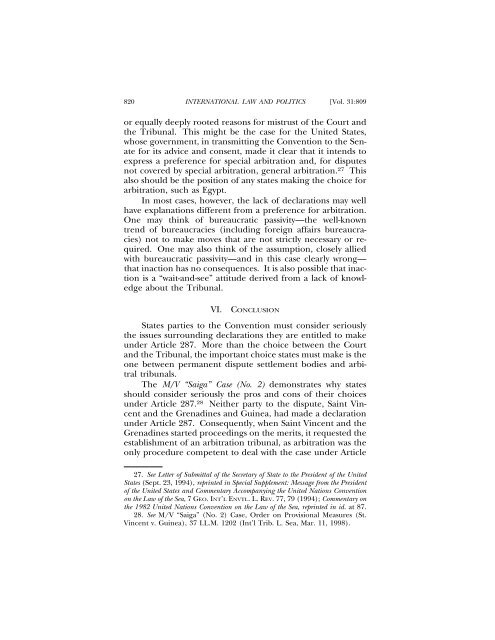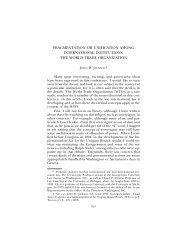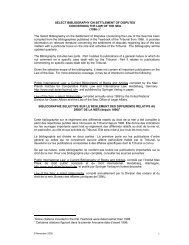Tullio Treves, Conflicts Between the International Tribunal for the ...
Tullio Treves, Conflicts Between the International Tribunal for the ...
Tullio Treves, Conflicts Between the International Tribunal for the ...
You also want an ePaper? Increase the reach of your titles
YUMPU automatically turns print PDFs into web optimized ePapers that Google loves.
820 INTERNATIONAL LAW AND POLITICS [Vol. 31:809or equally deeply rooted reasons <strong>for</strong> mistrust of <strong>the</strong> Court and<strong>the</strong> <strong>Tribunal</strong>. This might be <strong>the</strong> case <strong>for</strong> <strong>the</strong> United States,whose government, in transmitting <strong>the</strong> Convention to <strong>the</strong> Senate<strong>for</strong> its advice and consent, made it clear that it intends toexpress a preference <strong>for</strong> special arbitration and, <strong>for</strong> disputesnot covered by special arbitration, general arbitration. 27 Thisalso should be <strong>the</strong> position of any states making <strong>the</strong> choice <strong>for</strong>arbitration, such as Egypt.In most cases, however, <strong>the</strong> lack of declarations may wellhave explanations different from a preference <strong>for</strong> arbitration.One may think of bureaucratic passivity—<strong>the</strong> well-knowntrend of bureaucracies (including <strong>for</strong>eign affairs bureaucracies)not to make moves that are not strictly necessary or required.One may also think of <strong>the</strong> assumption, closely alliedwith bureaucratic passivity—and in this case clearly wrong—that inaction has no consequences. It is also possible that inactionis a “wait-and-see” attitude derived from a lack of knowledgeabout <strong>the</strong> <strong>Tribunal</strong>.VI. CONCLUSIONStates parties to <strong>the</strong> Convention must consider seriously<strong>the</strong> issues surrounding declarations <strong>the</strong>y are entitled to makeunder Article 287. More than <strong>the</strong> choice between <strong>the</strong> Courtand <strong>the</strong> <strong>Tribunal</strong>, <strong>the</strong> important choice states must make is <strong>the</strong>one between permanent dispute settlement bodies and arbitraltribunals.The M/V “Saiga” Case (No. 2) demonstrates why statesshould consider seriously <strong>the</strong> pros and cons of <strong>the</strong>ir choicesunder Article 287. 28 Nei<strong>the</strong>r party to <strong>the</strong> dispute, Saint Vincentand <strong>the</strong> Grenadines and Guinea, had made a declarationunder Article 287. Consequently, when Saint Vincent and <strong>the</strong>Grenadines started proceedings on <strong>the</strong> merits, it requested <strong>the</strong>establishment of an arbitration tribunal, as arbitration was <strong>the</strong>only procedure competent to deal with <strong>the</strong> case under Article27. See Letter of Submittal of <strong>the</strong> Secretary of State to <strong>the</strong> President of <strong>the</strong> UnitedStates (Sept. 23, 1994), reprinted in Special Supplement: Message from <strong>the</strong> Presidentof <strong>the</strong> United States and Commentary Accompanying <strong>the</strong> United Nations Conventionon <strong>the</strong> Law of <strong>the</strong> Sea, 7 GEO. INT’L ENVTL. L. REV. 77, 79 (1994); Commentary on<strong>the</strong> 1982 United Nations Convention on <strong>the</strong> Law of <strong>the</strong> Sea, reprinted in id. at 87.28. See M/V “Saiga” (No. 2) Case, Order on Provisional Measures (St.Vincent v. Guinea), 37 I.L.M. 1202 (Int’l Trib. L. Sea, Mar. 11, 1998).






